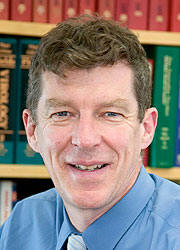|
By ALISTAIR MUNRO
Published on the 20 October 2013 in the Scotsman Newspaper
 HE MAY
be little known in his homeland, but a Scottish scientist has been dubbed an
Australian national treasure and “the man who saved a million lives”. HE MAY
be little known in his homeland, but a Scottish scientist has been dubbed an
Australian national treasure and “the man who saved a million lives”.
Edinburgh University graduate Professor Ian Frazer invented a vaccine to
prevent cervical cancer and was named Australian of the Year in 2006 and
National Living Treasure by the National Trust of Australia last year.
Cervical cancer kills more than a quarter of a million women a year and
Frazer’s vaccine – the first for a cancer – has been hailed as one of the
greatest breakthroughs in medicine this century.
Now the 60-year-old is the subject of a new biography, Ian Frazer: The Man
Who Saved A Million Lives, by award-winning broadcast journalist Madonna
King.
King said: “His determination to develop the technology for a vaccine is
inspirational, and he hasn’t given up with his research, and is now working
on a vaccine for herpes and non-malenoma cancer, which is a major disease in
Australia.
“He is a terribly shy man. It took me five years to persuade him to do the
book, which tells the incredible story of a man whose vaccine will continue
to save lives around the world.”
The father of two told Scotland on Sunday his interest in cervical cancer
stemmed from his time at Edinburgh University. “My early training in public
health at the Edinburgh medical school included work on cervical cancer
screening, which influenced my interest in this disease.
“My former mentor John Munro, who passed away recently, inspired me with his
motto ‘treat the treatable’ and I was encouraged by his interest in research
to prove whether treatments already in use were the best available.”
He added: “I realised when I went back to Edinburgh recently that it remains
my second home. I felt quite nostalgic wandering around my old student
haunts. However, my favourite memories are of the Highlands – skiing at
Aviemore, grouse beating in Glen Esk, walking in Skye.”
Before the discovery of a vaccine, cervical cancer was one of the top five
causes of death among women globally.
King tells of Frazer’s determination during more than a decade of clinical
trials and multi-million-dollar international legal brawls to bring the
vaccine to market. The biography deals with Frazer’s struggle for funding,
the loss of his co-researcher and friend Dr Jian Zhou, and his commitment to
making the vaccine available in the developing world.
King told Scotland on Sunday: “Before successfully developing the vaccine he
was relatively poor, as most scientists are not well paid. He even put up a
second mortgage on his house, but after patenting the vaccine he now makes
royalties from that. As a result, he is putting a million of dollars towards
getting the vaccine to women in Africa.”
Around 80 per cent of women who now die from cervical cancer live in
developing countries, the majority in Africa.
Frazer is the son of two Scottish scientists, Sam and Marion, who now also
live in Australia. He became interested in science at an early age, studying
at Robert Gordon’s College in Aberdeen before going on to Edinburgh
University.
King said: “As a student he did an exchange to an institute in Melbourne and
so impressed the doctors that they sent him a telegram asking him to move
there to work.
“Once here he was one of the first scientists to recognise HIV had entered
the Australian population, and he could have gone on to make his name with
Aids. But the issue he was really interested in was human papillomavirus (HPV),
which can cause cervical cancer. HPV was his passion and he worked with a
team to try to make the virus outside the body, and then go on to develop
the vaccine.
“It was eventually patented and is used worldwide to prevent the cancer.”
Australia has been an early adopter of the vaccine, introducing a free
schools-based HPV vaccination programme for 12-year-old girls in 2007, with
catch-up immunisation for women aged up to 26 years.
There are now more deaths in men than in women from HPV-associated cancers
in Australia. Many of the cancers are of the oral cavity, similar to the one
Hollywood star Michael Douglas developed in his tongue.
Visit
http://science.org.au/scientists/interviews/f/if.html for more
informaton. |

